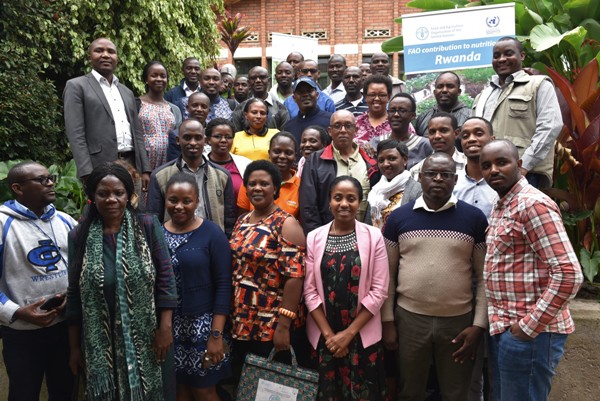
By Editor;
Kigali: Nutrition and agriculture must always work together to have the greatest impact in ending malnutrition for people in rural areas who mostly rely on agriculture for their livelihoods and well-being.
The observation was made by the Food and Agriculture Organisation (FAO) country representative, Gualbert Gbehounou while speaking in Musanze District at a two- day training on enhancing capacities for mainstreaming nutrition within agriculture in Rwanda.
The training was organised by the Ministry of Agriculture and Animal Resource (MINAGRI) in partnership with FAO to build the capacity of national institutions and districts to maximise agriculture sector’s contribution to nutrition agenda in the country.
The training brought together 42 national level specialist and officers from MINAGRI, MINALOC, RAB,NAEB, LODA and National Early Childhood Development Programme.
Rwanda is experiencing the burden of malnutrition and it remains a national challenge as stunting among children below age 5 stands at 38 per cent according to the 2015 Demographic and Health Survey (DHS).
Gbehounou underscored that tackling malnutrition requires stringent measures that include prioritising the nutrition sensitive agriculture given that agriculture and food systems have a crucial contribution towards the achievement of a world free from all forms of malnutrition.
“Agriculture is a starting point and important sector for nutrition; it can play a significant role in addressing the causes of malnutrition through value chain approaches while also tackling underlined systematic issues especially social and economic under development and inequalities,” he said.
“If you want to fight malnutrition you have to have a nutrition sensitive agriculture,” added Gbehounou, stressing “When we are looking for vitamins we have to make sure that the crop that we are growing has vitamins and that’s a start of a nutrition sensitive agriculture,”
He commended the Government of Rwanda as it embarked on multi-sectoral approaches including the establishment of National Early Child Development Programme and other policies in place that look to address all issues related to food and nutrition.
“The intervention is being made because Rwanda is politically committed to eradicate hunger and malnutrition and we have evidences for that. I would like to thank the Government of Rwanda that recognises malnutrition as a development threat,” said Gbehounou.
The permanent secretary at MINAGRI, Jean-Claude Musabyimana reiterated the government efforts to eradicate malnutrition revealing that the issue was prioritised in Strategic Plans for the Transformation of Agriculture (PSTA 4).
He stressed that the Government looks to transform agriculture from a sector characterized by low productivity to a sector using knowledge to increase productivity and investing in value addition in a bid to curb all forms of malnutrition.
“Agriculture sector has to play an important role in reducing and eliminating malnutrition to ensure food security and family production and this is done through an implementation of different programmes such as the crop intensification, one cow per poor family, integrated kitchen garden, promotion of mushroom consumption, national food reserve and establishment of food storage facilities at local level among other,” noted Musabyimana
The 2015 DHS indicates that acute malnutrition rate has declined from 5% in 2005 to 2% in 2015, while chronic malnutrition or stunting has reduced from 51% in 2005 to 38% in 2015. However stunting is still high and remains a national challenge in comparison with international public health standards. (End)
